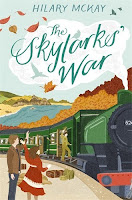 |
| (Amazon UK link) |
It’s primarily written from the viewpoint of a girl called Clarry. She was born ‘over 100 years ago’, as the start of the book tells us, and nobody was happy about her birth, other than her mother. Then her mother died. Clarry has an older brother, Peter, who was devastated and really didn’t want a new baby in the house. Their father is distant, a presence in the house but devoid of any real emotion.
Their grandmother comes to stay for a while but she has another grandchild, Rupert, to look after, at her home in Cornwall. Rupert is rather older than Peter and his parents work abroad. Rupert is very fond of his cousins and always there to greet them when they are older and go to stay for their long summer holidays.
Clarry is a likeable girl, despite the many disadvantages of her childhood. Peter soon accepts her as a willing shadow, admirer and fulfiller of most of his wishes. But always in the back of Clarry’s mind is a sense of guilt; she is convinced that it was her birth that killed their mother.
The book is written in short chapters, following Clarry as she grows up. She is bright, as is clear from the start, and eventually manages to get a place at a good girls’ school, and eventually at university. But the shadow of World War I is around her, although she’s mostly oblivious to it. Some of her immature ideas about the nature of war would be amusing if the reality were not so appalling. And when her cousin Rupert signs up and is sent abroad, he keeps his letters sanitised, talking about the countryside and the friends he makes, while playing down the horrors.
The style is very readable. It reminded me a little of Noel Streatfeild at the start, and also in the final, surprising and satisfactory but rather abrupt ending. It reminded me in places, too, of Michelle Magorian’s fiction. And there’s a style all of its own. The author had clearly done a great deal of research, and for the most part the historic parts tie in seamlessly with the fictional story. Clarry doesn’t feel entirely like a girl from the Victorian era; although she’s hemmed in by convention and adults, at times she speaks like a rather more up-to-date girl. It doesn’t matter too much; younger readers probably wouldn’t notice, and this is intended as a book for older children or younger teens.
It’s primarily a character-based book, and the main people were distinct enough to be memorable. The short chapters the excellent writing pulled me in, so that despite it being quite a long book, I finished it in just a couple of days. It’s an ambitious project, writing realistic children into situations 100 years ago, and on the whole I thought it very well done.
As a book intended for children, it’s not surprising that there’s no extreme gore or violence described, although there are some brief scenes that might upset a sensitive child. There are some shocks; two characters are casualties of war. There’s no strong language, and only the faintest hints of intimacy and love. On the whole families are contented, too, and care for each other. Peter and Clarry are emotionally neglected by their father, but much loved by their grandmother. There are neighbours who keep an eye on the children, and servants who look after them, meeting their physical needs.
And yet… for some reason, this book didn’t have the same emotional impact on me as, for instance, Noel Streatfeild's 'When the Siren Wailed', despite being rather better written. I can see that it’s a well-crafted book, and have already recommended it to friends who are interested in war-years books. I liked it very much. But somehow I didn’t fall in love with it quite as much as I expected to.
Still, definitely recommended to anyone from the age of about nine and upwards who likes character-based historical fiction.
And should anyone be interested... this is my 2000th book review on this blog, which I started in April 1999.
Review copyright 2019 Sue's Book Reviews
No comments:
Post a Comment